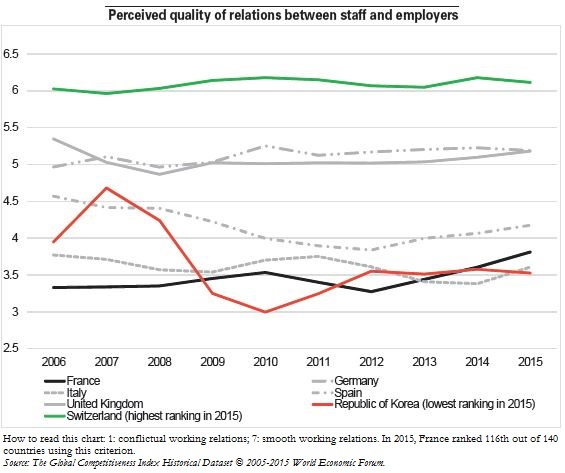Trésor-Economics No. 160 - 30 years of modernising social relations in France
Economic studies have found that effective social relations between unions and management are key to ensuring the economy runs smoothly. In surveys of the quality of labour relations, France tends to fare badly, however, although some improvement has been apparent over the last few years (see chart below).
Numerous measures aimed at modernising social relations have been introduced since the 1980s, gathering pace since the mid-2000s. Collective bargaining has been gradually overhauled to offer companies greater management flexibility.
The growing trend for unions and employers to negotiate labour standards at a more local level has gone hand-in-hand with increased legitimacy for the main stakeholders and the agreements reached. The rules according to which unions and employers' federations are considered representative and, as such, empowered to negotiate and sign collective bargaining agreements applicable to all of the workers they represent have been made even clearer.
As regards unions, the Act of 20 August 2008, which came into full effect in 2013, has completely revamped labour relations by switching from a system where unions are de facto recognised as being representative to one in which this recognition rests on the outcome of staff elections. As regards employers, the Act of 5 March 2014 introduced for the first time a rule to measure the level of representativeness based on membership. This rule will come into effect in 2017. At the same time, the legitimacy of collective bargaining agreements has been bolstered by the strengthening of the majority principle and the introduction of the right of opposition if 50% of the votes cast are won.
The Act of 17 August 2015 on labour relations and employment adds to these measures by streamlining labour-management relations at corporate level to boost their effectiveness. The French employee representation system stands out for its complexity and offers scant coverage to the smallest businesses. The new measures aim to correct this lack of representation for the latter and to authorise the largest companies to merge staff representation bodies subject to the agreement of labour and management representatives. In addition, requirements to negotiate and to provide employees with information and to consult them on relevant business matters have been rationalized. The frequency of negotiations can also be set by individual companies.
There would still appear to be some scope for improving the quality and efficiency of labour relations. This would entail more collective bargaining when drawing up labour standards to simultaneously promote economic efficiency and social progress as per the recommendations made in several recent reports. Furthermore, collective representation in companies with a headcount of 11-49 must be improved, and staff elections should be extended to include a wider range of active members of the labour force, whether they are employed or not.
